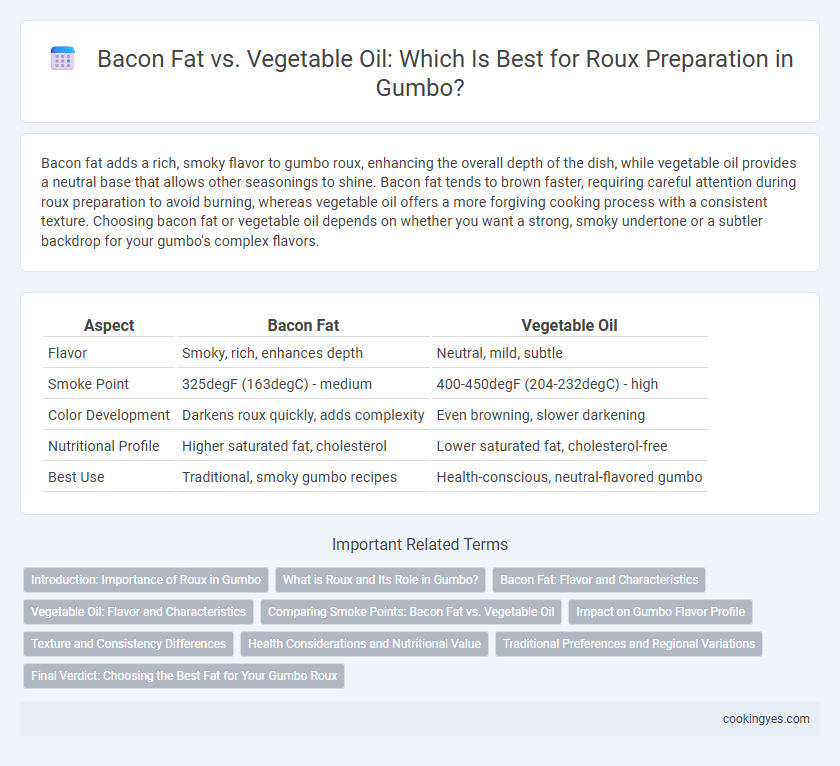Bacon fat adds a rich, smoky flavor to gumbo roux, enhancing the overall depth of the dish, while vegetable oil provides a neutral base that allows other seasonings to shine. Bacon fat tends to brown faster, requiring careful attention during roux preparation to avoid burning, whereas vegetable oil offers a more forgiving cooking process with a consistent texture. Choosing bacon fat or vegetable oil depends on whether you want a strong, smoky undertone or a subtler backdrop for your gumbo's complex flavors.
Table of Comparison
| Aspect | Bacon Fat | Vegetable Oil |
|---|---|---|
| Flavor | Smoky, rich, enhances depth | Neutral, mild, subtle |
| Smoke Point | 325degF (163degC) - medium | 400-450degF (204-232degC) - high |
| Color Development | Darkens roux quickly, adds complexity | Even browning, slower darkening |
| Nutritional Profile | Higher saturated fat, cholesterol | Lower saturated fat, cholesterol-free |
| Best Use | Traditional, smoky gumbo recipes | Health-conscious, neutral-flavored gumbo |
Introduction: Importance of Roux in Gumbo
Roux is essential in gumbo as it provides the rich, deep flavor and thickens the stew to the perfect consistency. Using bacon fat instead of vegetable oil for roux preparation adds a smoky, savory dimension that enhances the overall taste profile. Bacon fat also imparts a darker, more complex roux color, contributing to traditional gumbo authenticity and depth.
What is Roux and Its Role in Gumbo?
Roux is a mixture of fat and flour cooked together to create a thickening agent essential for gumbo, lending the dish its rich texture and deep flavor. Bacon fat, with its smoky aroma and robust flavor, enhances the roux, adding complexity that vegetable oil cannot match. Vegetable oil produces a cleaner, more neutral roux, allowing other gumbo ingredients to dominate the flavor profile without interference.
Bacon Fat: Flavor and Characteristics
Bacon fat imparts a rich, smoky flavor to gumbo roux, enhancing the dish's depth and complexity with its savory notes. Its natural smokiness and slightly salty profile create a more robust base compared to the neutral taste of vegetable oil. Using bacon fat also contributes to a darker, more flavorful roux, essential for authentic Cajun and Creole gumbo recipes.
Vegetable Oil: Flavor and Characteristics
Vegetable oil offers a neutral flavor that allows the complex spices and ingredients in gumbo to shine without overpowering the dish. Its high smoke point makes it ideal for roux preparation, ensuring even browning and consistent texture. This versatility in flavor and heat stability makes vegetable oil a preferred choice for achieving the perfect gumbo base.
Comparing Smoke Points: Bacon Fat vs. Vegetable Oil
Bacon fat has a smoke point around 325degF (163degC), making it suitable for low to medium heat roux preparation, while vegetable oils like canola or peanut oil have higher smoke points between 400degF to 450degF (204degC to 232degC), allowing for higher heat cooking. Using bacon fat adds a rich, smoky flavor to gumbo but requires careful temperature control to prevent burning. Vegetable oil's higher smoke point offers more stability and flexibility, making it ideal for creating a smooth, dark roux without the risk of early smoke or acrid taste.
Impact on Gumbo Flavor Profile
Bacon fat imparts a rich, smoky depth to gumbo, enhancing its savory complexity and adding a distinctive umami character that complements the dish's traditional ingredients. Vegetable oil provides a neutral base, allowing the natural flavors of the seafood, sausage, and spices to shine without interference. Choosing bacon fat for the roux elevates the gumbo's flavor profile by introducing subtle smokiness and a more robust, layered taste.
Texture and Consistency Differences
Bacon fat in roux preparation imparts a richer, smokier flavor with a slightly thicker and silkier texture, enhancing the gumbo's depth. Vegetable oil creates a smoother, more neutral roux, allowing other ingredients to shine while providing a consistent, velvety base. The choice between bacon fat and vegetable oil impacts gumbo's overall mouthfeel, with bacon fat offering a slightly more robust and complex consistency.
Health Considerations and Nutritional Value
Bacon fat imparts rich flavor to a gumbo roux but contains higher levels of saturated fat and cholesterol, which may impact heart health when consumed in excess. Vegetable oil, such as canola or peanut oil, offers a healthier alternative with unsaturated fats that support cardiovascular health and provide essential fatty acids. Selecting vegetable oil can reduce calorie density and promote better lipid profiles, aligning with dietary guidelines aimed at reducing chronic disease risk.
Traditional Preferences and Regional Variations
Traditional gumbo recipes from Louisiana often favor bacon fat for roux preparation due to its rich, smoky flavor that enhances the dish's depth, especially in Cajun and Creole cooking. In contrast, vegetable oil is preferred in some regional variations for its neutral taste and higher smoke point, allowing for a darker roux without the risk of burning. This choice reflects local ingredient availability and flavor profiles, with bacon fat highlighting rustic, hearty gumbo styles and vegetable oil catering to milder, more versatile versions.
Final Verdict: Choosing the Best Fat for Your Gumbo Roux
Bacon fat imparts a rich, smoky depth that enhances the complexity of gumbo roux, creating a robust flavor profile favored in traditional Cajun recipes. Vegetable oil offers a neutral taste and higher smoke point, providing consistency and ease in achieving the perfect dark roux without overpowering other ingredients. For an authentic, deeply flavored gumbo, bacon fat is ideal, while vegetable oil suits cooks prioritizing control and subtlety in roux preparation.
Bacon fat vs vegetable oil for roux preparation Infographic

 cookingyes.com
cookingyes.com